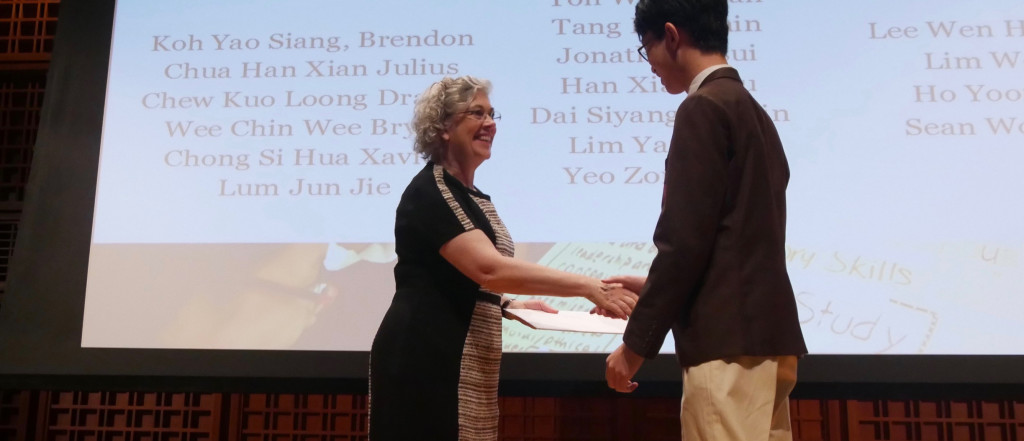Yale-NUS College hosts the Humanities and Social Sciences Research Programme (HSSRP) Symposium, welcoming budding researchers

On 5 November 2016, Yale-NUS College hosted the Humanities and Social Sciences Research Programme (HSSRP) Symposium, the culmination of a seven-month research mentorship programme for secondary school students in Singapore.
The programme is organised by the Gifted Education Branch, Curriculum Planning and Development Division of the Singapore Ministry of Education (MOE). It aims to allow Secondary Three and Four students to carry out research with the mentorship of experts in their fields of study.
Professor Jane M Jacobs (in photo), Director, Division of Social Sciences and Head of the Urban Studies programme at Yale-NUS, was the Guest-of-Honour at the Symposium and faculty members from the College also served as mentors to the budding researchers.
“Research creates knowledge… upon which other researchers can build, from which other students learn, from which policy-makers and society-makers draw,” Professor Jacobs said in her opening address in the College’s Performance Hall, citing the importance of encouraging humanities and social science research among youth.
95 participants produced a total of 53 research papers, which they first presented at a Project Review. The Symposium was an opportunity for participants to present their research findings to a wider audience. Three Outstanding Papers selected at the Project Review were also showcased and the students also fielded questions from the audience after each presentation.
One such paper, co-authored by Betty Lam Jia Wen and Nwe Cherry Khine, students at the NUS High School of Mathematics and Science, explored whether students’ impression of race affects their perception of peers.
“Especially in multi-racial Singapore, this will be very important,” said Betty. “If we can find a way to mitigate such bias, we can improve the social cohesion among races.”
Professor Jacobs expressed amazement at the way the students presented their projects and commented, “They were competent, they were articulate, and they fielded many questions from their peers with grace.”
Professor Jacobs also observed that the projects showed “methodological diversity”— experimental and qualitative, and “topical diversity”—from stereotype and bias, to the politics of environmental governance, to the experiences of the elderly in Singapore.
The programme started in end 2015 with the submission of research proposals by the students. Mentors then chose proposals most aligned to their fields of research, and worked with selected students to further refine their projects.
This year, two Yale-NUS faculty members mentored selected research projects: Dr Guillem Riambau-Armet, Assistant Professor of Social Sciences (Economics), and Dr Jean Liu, Assistant Professor, Social Sciences (Psychology) at Yale-NUS.
“For me it was very important they answer questions that haven’t been asked anywhere in the world,” said Dr Liu, “and they rose to that challenge.”
This year marks Dr Liu’s third year mentoring HSSRP participants. But prior to being approached by the MOE to become a mentor, she was a student participant herself. “I keep thinking of the type of support I received which led me to where I am now,” said Dr Liu.
Yale-NUS College supports a vibrant community of undergraduate researchers in the Social Sciences and Humanities through a variety of schemes. For instance, Dr Liu coordinates the College’s Summer Social Sciences Research (SSSR) programme, which allows students to gain hands-on research experience with the supervision of Yale-NUS professors during their mid-year break.
With the multitude of prospects available at the College to gain first-hand exposure in faculty laboratories, students are also encouraged to approach professors to seek their own research opportunities. “Many [faculty] projects are very amenable to student involvement, and it just takes asking a professor,” said Dr Liu.
Dr Liu also stressed that research does not end with the conclusion of the symposium, but is instead an on-going process. “Real-life research goes far beyond that—your project may not work out, or you want to ask something else about the same phenomenon. So you try again, and again,” she shared.
Dr Liu hopes that some of the HSSRP participants will come to the College in a few years and continue to conduct novel research in their fields of interest. Professor Jacobs echoed the sentiment, saying that she would like Yale-NUS to become a familiar place to local students, such that they may later imagine themselves as a part of the College’s community of learning.
“I’m really delighted that Yale-NUS College could be the host for this year’s Symposium,” said Dr Jacobs. “It’s really important too, when we have such a beautiful campus, and such excellent faculty, that we give in a wider sense to the community; this is an opportunity to do that.”





